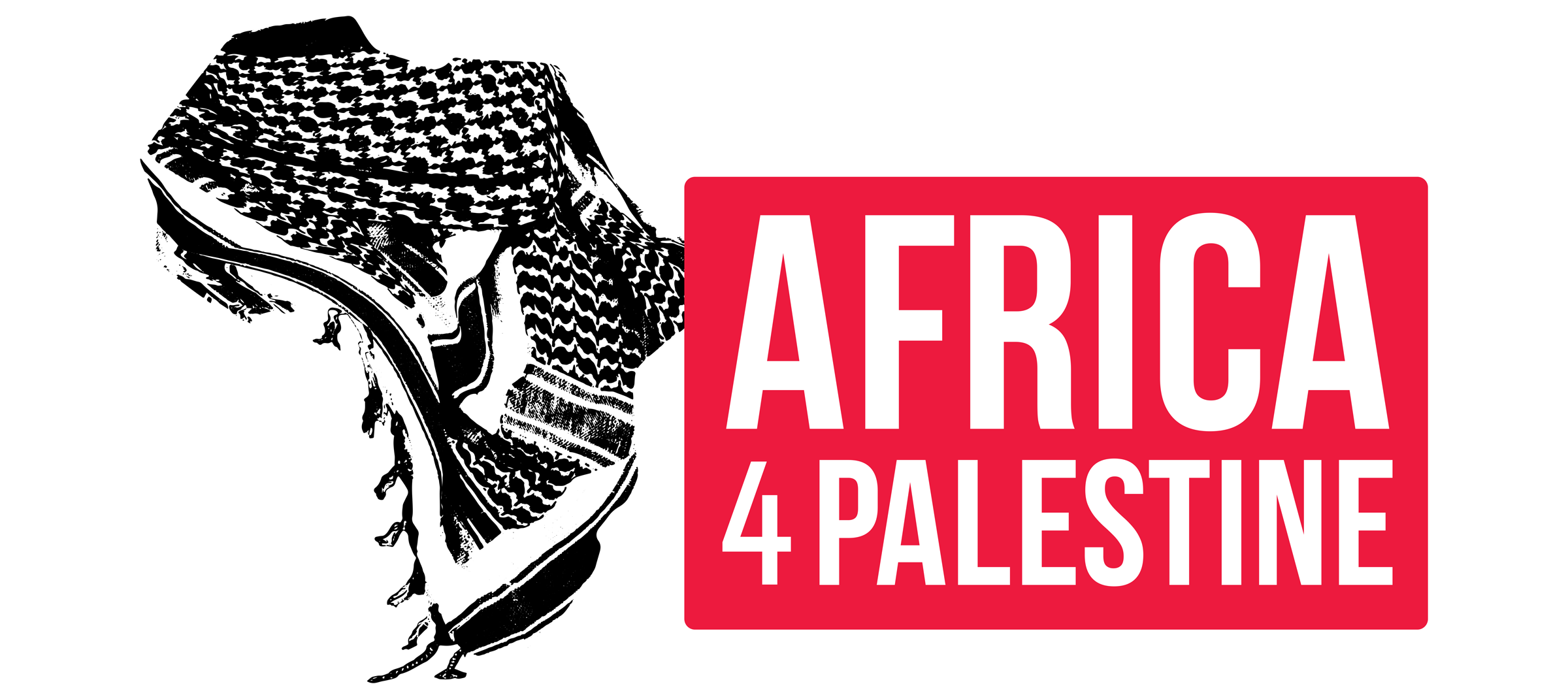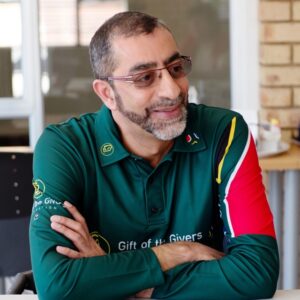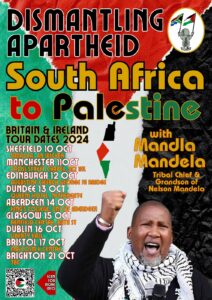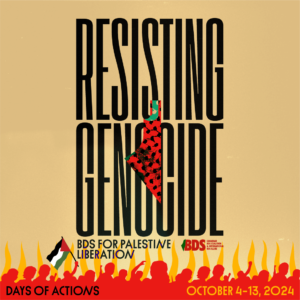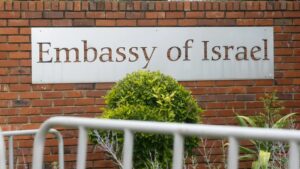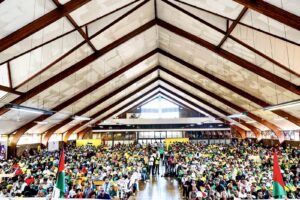Ali Jiddah speaks with a tour group in the Old City of Jerusalem in March 2014. Ryan Rodrick Beiler
In early June the African Community Club in Jerusalem’s Old City was crammed with mourners. They had come to pay their respects to the late Subhiyeh Sharaf, an amiable woman and community elder.
The club serves as the headquarters of the African Community Society. It is a gathering place for the African community and a social and cultural center for Palestinians, screening films and hosting debates and other activities.
Outside the club, young men were running to bring tea to every incoming guest and maintain order. The necessary funds for Sharaf’s funeral ceremony were raised through donations as is typically the case during occasions of mourning and celebrations that take place in the African community here.
This is known as hatita, a longstanding tradition among Jerusalem’s African-Palestinians, in which community members contribute a certain sum of money according to their ability.
The tradition mirrors the strong ties and communal solidarity that distinguish the African community in Jerusalem. Most of this community, of approximately 350 people, live in the Muslim Quarter of the Old City.
Interviews with members of the community and the society’s Arabic website reveal a rich history. African migration to Jerusalem dates back to 634 when Omar Bin al-Khattab, the second Muslim caliph, conquered Jerusalem. But it wasn’t until the beginning of the 20th century that Africans started settling in Jerusalem in significant numbers.
Coming mainly from Chad, Sudan, Nigeria and Senegal, Africans flocked to Jerusalem for two main reasons. The first was religious: some considered Jerusalem the final destination of their pilgrimage. The second reason was their willingness to fight along with Palestinians against British and Zionist colonialism.
Guardians of mosque
The Africans who came to Jerusalem were initially scattered across the city but were in the early 1930s concentrated in two buildings facing each other, a few meters away from one of the main gates to al-Aqsa mosque. The gate is known as Bab al-Nazir or Bab al-Majlis.
The neighborhood itself was built in the 13th century and is characterized by its Mamluk-era architecture. It primarily served as a resting place for pilgrims and as a shelter for the poor and the homeless.
During the final years of Ottoman rule, the buildings were turned into a notorious prison compound where rebels against the Ottomans were held, including African dissidents. Following the end of Ottoman rule, the buildings — referred to as al-Ribat al-Mansouri (or al-Ribat al-Kurdi) and al-Ribat Aladdin al-Bassir — became part of the Islamic Waqf, a religious trust.
In the early 1930s, Palestinian political and religious leader Sheikh Amin al-Husseini leased them to Jerusalem’s Africans.
While taking pride in their African roots and trying to preserve their ancestral traditions, Africans in Jerusalem have largely integrated with other Palestinians and were woven into the Palestinian Jerusalemite fabric. This integration was facilitated by shared religious ties, the sense of belonging that Africans immediately formed with Jerusalem and the fact that African migrants could easily interact in Arabic.
The two most powerful manifestations of this integration are social and political. On the social level, intermarriages between Africans and other Palestinians in Jerusalem are common, occasional complications notwithstanding.
Active in struggle
This is not to say that racism against African-Palestinians doesn’t exist. Some Palestinians who are not from Jerusalem pejoratively refer to the African community as the “neighborhood of slaves,” for instance.
Mahmoud Jiddah, an African community member and alternative tour guide, told The Electronic Intifada that “we occasionally face racism by other Palestinians due to our darker skins, but by no means can you say that this is a trend. Far from it.”
He added that the main perpetrator of racism is the Israeli police. “We face a twofold oppression by the Israeli occupation: first because we are Palestinian; and second because we are black,” he said.
On the political level, Africans have been strongly involved in the Palestinian struggle.
Jiddah, whose father migrated to Jerusalem from Chad at the beginning of the 20th century, said that Africans were particularly active in the Arab Salvation Army and played a key role in the Jerusalem battles during the 1948 Nakba, Israel’s ethnic cleansing of Palestine. In fact, the commander of the battalion that prevented the fall of Jabal al-Mukabber — an East Jerusalem neighborhood — in 1948 was the Nigerian-born Muhammad Tariq al-Afriqi.
Africans also suffered their fair share of displacement during the Nakba with almost one-quarter of the original African population in Jerusalem becoming refugees in neighboring countries.
The role of Africans in the Palestinian liberation struggle became even more notable following the 1967 occupation of East Jerusalem.
The very first female Palestinian political prisoner was Fatima Barnawi, a Palestinian of Nigerian descent, who served 10 years in Israeli occupation jails after a foiled bombing attack in Jerusalem. She was released in a 1977 prisoner exchange and deported.
During the height of the first intifada, a high percentage of the African population — both male and female — was imprisoned.
The first Palestinian killed during the second intifada was Osama Jiddah. A member of the African community, he was shot dead by Israeli forces on 29 September 2000 while on his way to donate blood in al-Maqased hospital on the Mount of Olives.
These are just a few examples of the active participation of the African community in the Palestinian struggle for liberation that belies their relatively small numbers. For the African community, resistance is not a choice, but an obligation made unavoidable by living in the Old City.
Passport racism
For some people coming from other places in Palestine to pray in Jerusalem for the first time, it is not obvious that there is a community that lives a few meters away from one of the holiest Muslim sites. Their initial reaction when they learn about it is to say that these people are so lucky and blessed.
For African-Palestinians, however, this can occasionally be a blessing in disguise.
Living in the heart of the Old City means being a target of Israel’s constant attempts to drive Palestinians out of this place and erase Palestinian identity and existence. In this context, Israel systematically denies building permits to African-Palestinians living in the Old City.
Even minor restorations or the building of an additional room are banned, forcing people to smuggle basic construction materials into the neighborhood. Newly-built Israeli settlements in the city are quickly restored and expanded, while Palestinians are threatened with demolitions if they build one additional room or restore their houses.
Restrictions on building — combined with high levels of poverty and unemployment — have forced some members of the African community, particularly the younger generation, to look for residence outside the Old City. Many have moved to areas like Beit Hanina or Shuafat because it is extremely difficult to accommodate a growing family in the Old City.
This problem is faced by all Palestinians in the Old City. But one problem unique to African-Palestinians is that — unlike most Palestinians in Jerusalem — many of them do not have a Jordanian passport.
“My father carried a French passport which he gave up following Chad’s independence in 1960,” said Mahmoud Jiddah. “When he applied for a Jordanian passport — since Jerusalem was under Jordanian rule then — it took him more than four years to receive it … But even the fact that my father carried a Jordanian passport doesn’t mean that I could automatically attain one. I’ve only received a temporary passport a couple of years ago and it’s about to expire.”
Jiddah added that he has a list of 50 African-Palestinians from Jerusalem who are banned from receiving a Jordanian passport. He explained that this Jordanian policy of refusing to give passports to African-Palestinians has to do with considering them “strangers.”
He said: “Imagine — we’ve been living here for our entire lives and we’ve sacrificed everything for Jerusalem and the Jordanian authorities consider us strangers. But when they ruled over Jerusalem in 1948, they suddenly became the kings.”
African-Palestinians are forced to travel using a laissez-passer, which means they are not allowed to visit Arab countries with which Israel has no diplomatic relations. Alternatively they are left with the option of applying for a Palestinian Authority or international passport which could jeopardize their residency status in Jerusalem. The other option left is to apply for an Israeli passport, which the community strongly rejects.
Microcosm
In a sense, the African community in Jerusalem is a microcosm of the challenges Palestinians in Jerusalem face, and of the resilience they maintain.
Jiddah was arrested by Israeli occupation forces on 5 September 1968, along with his brother Abdullah and their cousin and comrade in the Popular Front for the Liberation of Palestine, Ali Jiddah.
Mahmoud was sentenced to 25 years in jail, while Ali was sentenced to 20 for planting bombs. Both of them were released in 20 May 1985 in a prisoner exchange between Israel and the splinter group PFLP-GC.
A self-proclaimed Palestinian, African and socialist, Mahmoud, like his cousin, refused all pressure to deport him from Jerusalem. The men preferred to spend most of their lives in jail over leaving Jerusalem.
Mahmoud’s brother Abdullah, though, was deported in 1970, and was separated from his family and city.
“The first time I saw my brother was in Switzerland in 1993 when I got an invitation to a human rights conference in Geneva. I will never forget that moment,” Jiddah said. “The second time we met after that was in Jordan in 2012, which only makes me wonder: do I still have 20 years left in my life to see my brother again?”
Mahmoud Jiddah is as old as the Nakba. His community embodies the Palestinian narrative of uprooting, defiance and survival in all of its details.
Budour Youssef Hassan is a Palestinian blogger and law graduate based in Jerusalem. Blog:budourhassan.wordpress.com. Twitter: @Budour48
